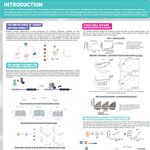Exploring host-directed therapeutic targets for Mycobacterium tuberculosis: New perspectives from South Africa
Improved treatments are needed for nearly all forms of Mycobacterium tuberculosis (Mtb) infection. Adjunctive host-directed therapies (HDTs) have the potential to shorten tuberculosis (TB) treatment duration, prevent resistance and reduce lung damage by modulating regulatory pathways in dysregulated immune cell populations. In other human diseases such as cancer, diabetes and auto-immunity, HDTs that modulate energy metabolism can improve clinical outcomes. In this study, we looked at TB disease progression and the response to therapy through a metabolic lens. We show that chronic Mtb infection leads to a progressive decline in the metabolic health of T cells that reside in lung lesions, and that metformin HDT can reinvigorate these cells. We also demonstrate that measuring the metabolic health of T cells in subject blood samples can be linked to disease progression as well as to the subject's response to therapy. These findings provide new insights about Mtb pathogenesis that offer unique possibilities for metabolically-targeted immunotherapies to improve current TB treatment outcomes, particularly when standard therapy is no longer an option (i.e., MDR/XDR-TB).





